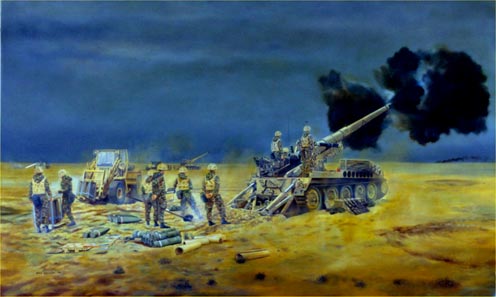
"32 Regiment Royal Artillery in the Gulf War, 1991"
Ref: DR049
by David Rowlands
Image Size 58 x 38 cm
The Artillery Raids preceded the ground offensive by several days. The Raids began on 18 February and lasted until the offensive (24 February). WO1 (RSM) Dave Hill drove me 30 km across the desert to 32 Regiment’s location. The Regiment was equipped with M110 self-propelled howitzers. I watched a detachment of 74 Battery (Battle Axe Company) at gun drill. The Battery Commander was Major Bob Eggar RA. The No. 1 of this gun was Sergeant Warren.
The guns worked in pairs (a section) about 20 metres apart. There is a shell placed in the loading tray. There was no time to lay out bag charges and shells on the ground between the ammunition wagon and the gun. Six shells were stacked upright on a pallet, wired together. During the Artillery Raids the ammunition wagon would drive close to the rear of the gun, unload its ammunition and withdraw. But during the ground offensive it would drive up, unload and remain there, (as seen at the far gun). Otherwise, a tractor would deliver a unit load container (ULC) of ammunition, as seen here. After the bag charges were removed, the green containers were slung untidily to the rear left of the gun, and cardboard wrappers were blowing about. The No. 1 pulls the lanyard to fire the gun. There is a black No. 1 headset cable running from under his helmet, running over the spade box (on the ground at left side of gun) and plugged into the radio stack (on the gun).
During the fighting period, each gunner wore body armour over his NBC suit. Black, rubber NBC over-boots were worn early on in the campaign, but were not worn during the ground offensive; nor were NBC gloves. The respirator was in its pouch at the left hip. Ear defenders (very small, and not visible) are worn by the men standing on the gun. Some ammunition numbers behind the gun don’t wear them as a rule, so that they can hear shouted instructions. When the gun is about to fire, they put their hands over their ears and bend forward. Due to the rapid advance during the conflict, the usual practice of erecting camouflage netting (draped on poles) over the gun was dispensed with. The men’s webbing and small arms (Self Loading Rifles and Sub Machine Guns) were laid out on a tarpaulin along the right side of the gun.
At the front of the gun were two green charge containers, tied on with bungee cords, containing the men’s personal equipment. There are no bergen rucksacks carried on the gun. During the busy first two days of the conflict, the men were dirty and unshaven, being continuously on the move.
In the background a drone is being launched.
The CO was Lt Col Peter Marwood RA.
